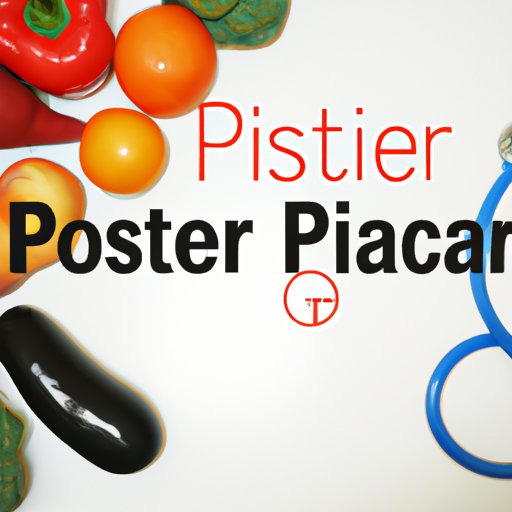
I. Introduction
Prostate cancer is a disease that affects the prostate gland, which is found in men. It is one of the most commonly diagnosed cancers in men and affects millions of individuals worldwide. According to the American Cancer Society, one in every eight men will be diagnosed with prostate cancer at some point in their life. It is essential to discuss tips to prevent prostate cancer and its impact on society. This article aims to provide friendly and informative tips for individuals to prevent prostate cancer.
II. Maintaining a healthy diet
One of the best ways to prevent prostate cancer is to maintain a healthy diet. Consuming a balanced diet rich in fruits, vegetables, and whole grains has been linked to reducing the risk of prostate cancer. Foods high in lycopene such as tomatoes, grapefruit, and watermelon are also beneficial. On the other hand, foods high in saturated fat such as red and processed meats should be avoided. A diet low in dairy products and calcium may also reduce risks.
III. Maintain a healthy weight
Obesity can increase the risk of prostate cancer. Therefore, maintaining a healthy weight is crucial for men. Incorporating physical activity and having a balanced diet is beneficial for maintaining a healthy weight. A healthy weight is a great lifestyle choice linked to reducing the risk of prostate cancer.
IV. Regular physical activity
Physical activity can help reduce the risk of prostate cancer. At least 30 minutes of daily physical activity can help keep the body healthy and reduce the risk of prostate cancer. Exercises such as jogging, aerobics, and cycling are just a few examples of physical activities that may be beneficial in reducing prostate cancer’s risk. Physical activity is also a great way to maintain a healthy weight, thus preventing obesity and reducing the risk of prostate cancer.
V. Reduce alcohol consumption
Excessive alcohol consumption can increase the risk of prostate cancer. The recommended amount of alcohol per day by the National Institute on Alcohol Abuse and Alcoholism is up to two drinks daily. Reducing alcohol intake to the recommended amount or less can help reduce the risk of prostate cancer. Finding other ways to reduce alcohol intake may include substituting alcoholic beverages with healthier options such as fruit juice or water can help reduce the risk of prostate cancer.
VI. Get screened
Early detection can help individuals manage and treat prostate cancer. Get screened for prostate-specific antigen (PSA) test, which can detect prostate cancer early. The PSA test is recommended for men aged 50 and above or earlier for high-risk individuals or individuals with a family history of prostate cancer. Speak to your doctor about your medical history before getting screened.
VII. Don’t smoke
Smoking is linked to prostate cancer. Quitting smoking has numerous health benefits that can potentially reduce the risk of prostate cancer. Quitting smoking might be challenging, but the benefits are worth it. Assistance available for quitting smoking includes medications, therapy, and support groups.
VIII. Reduce the intake of red and processed meat
Red and processed meats have been linked to an increased risk of prostate cancer. It is recommended to reduce the intake of red and processed meat or substitute it with plant-based foods or leaner meats sources, such as chicken or fish. The recommended dietary change is to reduce meat intake to less than 500g (18 oz) cooked weight per week.
IX. Conclusion
Prostate cancer affects millions of men worldwide, and prevention is essential. By incorporating the tips discussed in this article, individuals can reduce the risk of prostate cancer. Maintain a healthy diet, maintain a healthy weight, engage in regular physical activity, reduce alcohol consumption, start screening, quit smoking, and reduce the intake of red and processed meat. By using these tips, individuals can start incorporating healthy lifestyle choices into their daily lives and potentially reduce the risk of prostate cancer.





